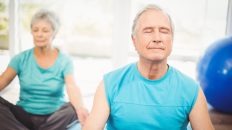By Michael Greger, MD
Thank you to our friends at NutritionFacts.org;
Hi. I’m Dr. Eddie Phillips. I’m a physician specializing in lifestyle medicine and board certified in Physical Medicine and Rehabilitation.
Do you know that standing up and moving around during the day can pay off with big health benefits?
Of course, regular workouts are best for optimal health. But getting up from your desk or seat often is a great habit to establish even if you already exercise.
Research has shown that sitting continuously for hours can increase your risk of serious ailments. These include heart disease, type 2 diabetes and even certain cancers.
So the message here is that routine movement during the day adds to the benefits of regular exercise.
That was the conclusion of a large, long-term study of 123,000 middle-aged adults by researchers from the American Cancer Society, published in the American Journal of Epidemiology.
Women who sat the most had a 34 percent greater risk of dying from any cause over the 14 years of the study compared with those who sat the least.
For men, the increased risk of dying from any cause was 17 percent.
When exercise was factored in, the difference was even more significant.
The most sedentary women, who neither moved nor exercised a lot, were almost twice as likely to die as those who moved and exercised the most.
The most sedentary men were 50 percent more likely to die than their more active counterparts.
Similarly, other studies have concluded that routine, everyday movement has benefits, whether for heart disease, diabetes, cancer or weight loss. It’s gotten to the point now where some doctors actually advise their patients to sit only “in moderation.”
Why does prolonged sitting have such negative health consequences? One explanation is that it relaxes your largest muscles.
When muscles relax, they take up very little sugar—the type called glucose—from the blood, increasing your risk of type 2 diabetes. In addition, the enzymes that break down blood fats—called triglycerides—nosedive, causing levels of the “good” cholesterol—HDL—to fall, too.
The result is a higher risk of heart disease.
By contrast to this, everyday movement not only reduces your risk of major ailments, but also helps you burn more calories.
Dr. James Levine at the Mayo Clinic coined the term “non-exercise activity thermogenesis,” or NEAT. It refers to the energy you burn through ordinary activity that you don’t think of as exercise. Such activities include carrying the laundry upstairs, dancing around the house to your favorite tune, or even standing while you talk on the phone.
In one study, he measured NEAT in lean and obese people, all of whom had similar jobs and were forbidden to exercise during the course of the study.
There was one key difference between the two groups. The obese people sat longer than their lean counterparts, by an average of two-and-a-half hours more per day.
So the lesson to be learned from this is to get off that chair as often as you can.
Take a quick stroll down the hallway. Stand up to read a document or two. Stand up and move while talking on the phone.
Some offices now provide standing desks and chairs built around exercise balls to keep you in motion even while sitting.
No matter what strategy you use, if you can avoid sitting for long periods you’ll improve your health and feel better during the day.
Workout Workbook: 9 Complete Workouts to Help You Get Fit and Healthy. Harvard Health Publications, Gardiner J., Prouty J., Bean, J. (2014). Harvard Medical School Special Health Reports.
Leisure time spent sitting in relation to total mortality in a prospective cohort of US adults. Patel AV, Bernstein L, Deka A, Feigelson HS, Campbell PT, Gapstur SM, Colditz GA, Thun MJ. Am J Epidemiol. 2010 Aug 15;172(4):419-29. doi: 10.1093/aje/kwq155. Epub 2010 Jul 22.
Nonexercise activity thermogenesis–liberating the life-force. Levine JA. J Intern Med. 2007 Sep;262(3):273-87.




